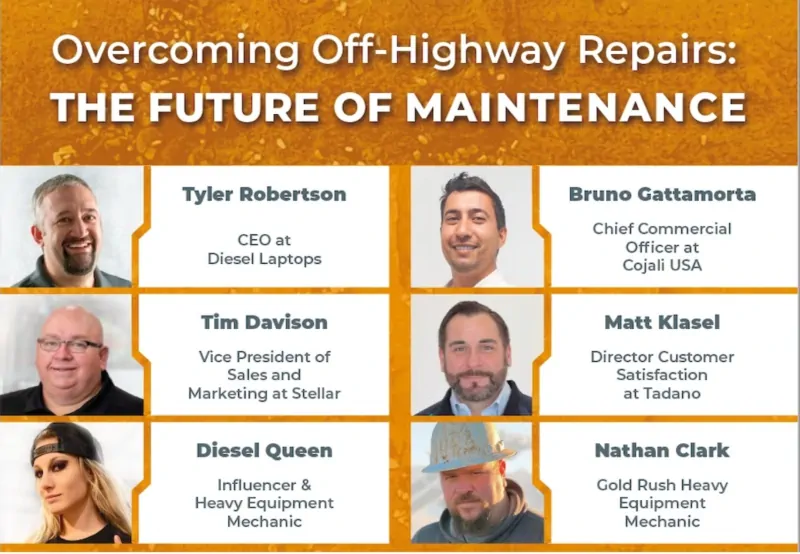
OVERCOMING OFF-HIGHWAY REPAIRS-THE FUTURE OF MAINTENANCE
One of the most fascinating discussion panels at ConExpo was the session on Overcoming Off-Highway Repairs: The Future of Maintenance.
While the panel did not always see eye to eye on some issues, they were all strong advocates for training technicians.
The Panel was moderated by Tyler Robertson, CEO, Diesel Laptops, who asked a wide range of industry questions to his panel of expert guests:
- Bruno Gattamorta, Chief Commercial Officer, Cojali
- Matt Klasel, Director Customer Satisfaction, Tadano
- Melissa Petersmann, Social Media Influencer known as the Diesel Queen and Heavy Equipment Mechanic
- Nathan Clark, Gold Rush Heavy Equipment Mechanic
- Tim Davison, Vice President of Sales and Marketing, Stellar
The panel tackled several challenging topics, and so the Service Truck Team thought we would break it down into two different articles, one focusing on training and industry image issues and one article about current challenges in the industry.
The issue of training came up as a challenge at many different points during the panel discussion, as well as attracting people to the industry.
“You can hand people the best technology in the world, but it does not help them actually solve the problem… It’s not just the tool, they need the training,” Robertson noted. “Software is 5% of the solution the other 95% is ‘How do I actually fix the problem I have?’”
Participants on the panel agreed that so many issues really come down to training and that there is not enough continuing education in the United States for diesel technician. Technology has moved so fast, so hard. Now we have EV trucks, robotic trucks, but in the aftermarket it is not easy to keep diesel techs up to date on all of the latest innovations.
Both moderator Robertson and Petersmann came from a dealership background. Robertson said that people assume that because they came from a dealership background they had lots of factory training, it was not his reality, but he asked Petersmann if that was her reality and what “stupid stuff” she saw.
Petersmann gave the example of the number of times a controller was replaced (value of $3000 to $5000 dollars) when all that needed to be replaced, for example, was a fuse. Because technicians did not go through proper procedures and testing. “You can have all the electronics in the world, but if you do not know how to physically run the rest, read a multi-meter and run the wires, the technician will not be able to solve the problem,” Petersmann said.
Petersmann advocated, in particular, for more electronic diagnostics training – “even for people from my generation.”
When asked how Stellar stay on top of changes in technology? Davison said that Stellar gets engineers out in the field.
“Electronic equipment for an operator is a training aid for the operator,” Davison shared. “It is not going to do their job for them, it’s never going to replace a mechanic, but the more aids we can give them will we can help them in getting their job done faster and becoming more productive.”
When asked by Robertson what the biggest challenges were impacting their business, most of the panelist touched on training.
Davison also addressed the industry’s “perception” issue. In his answer he said that one of the biggest challenges to the industry are political and government resistance to the industry. “All of a sudden if you turn dirt, you are not popular,” he said. But he also wanted to remind politicians that “nothing starts until earth is turned. Even with EVs, you could not have a single EV in the world, if there was not a miner somewhere in the world digging dirt to get the components for the batteries…We need to understand what the working person does in the world.”
“I talk to a lot of technicians, and it is still the training.” Said Clark. He said if you do not train your people, they will go somewhere else, because they want to grow. They want to be the best technician they can be.
Gattamorta agreed that training and education are key. And the ability to provide people with as much data as possible so that they can make informed decisions.
The tools and the training are important Petersmann said, “but if you don’t have the people, you have nothing.”
Robertson asked Petersmann what she thinks it will take to get enough diesel technicians. She noted, as she has many times on her podcasts, that high schools need to teach these skills in school. In her high school in Laramie, Wyoming, to graduate she needed to have taken one semester of automotive and one semester of woodworking.
It introduces those industries to a lot of kids that have had no exposure to it. Petersmann said she would love to see more high school education about the industry, changing the image from a “dirty” one to one that is attractive. As she said, “you don’t need to have a college degree. I make more money than some of my friends with a college degree.”
Robertson agreed that there are a lot of issues in the education systems in the United States that need to be addressed. He also noted that “96% of diesel techs are male, I don’t know of any single industry that does not have an employment problem when it is predominantly one sex…It needs awareness. People need to know that it is a great career.”
Klasel agreed that we need to change the perception of the industry. “Everyone holds a doctor in high esteem. When a doctor makes a mistake, that mistake gets buried. When a technician makes a mistake, that mistake is corrected at no charge. So, don’t begrudge your technicians their due.”
by Denise Faguy
Read the Full Article at ServiceTruckMagazine.com


